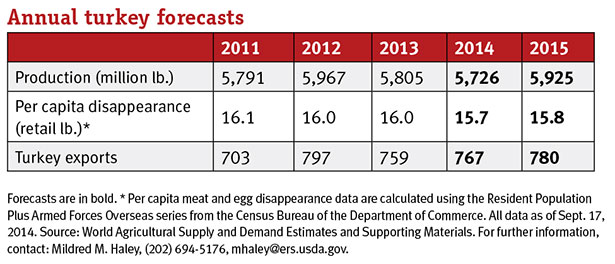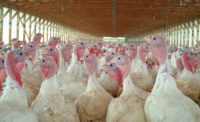The turkey industry’s economic recovery picked up steam through most of 2014 and seems well-positioned going into the expected production bump (based on poultry placements) in September-October production. However, the key to the successful business of profitable production is to increase the consumer demand for turkey.
The National Turkey Federation, led by chairman Gary Cooper of Cooper Farms, has identified opportunities for increasing demand beyond the annual consumption of 16-17 pounds of turkey per capita. Rather than the umbrella-type marketing of recent decades, Cooper’s goal is product promotion and increased awareness among key influencers of retail and foodservice consumers.
NTF’s role is to be the catalyst to deliver opportunities for increased demand that can be incorporated by member companies and sustained over several years. A volunteer group of NTF member company senior executives and marketers has examined how to influence this awareness, leverage our export opportunities through USAPEEC, and more accurately measure the demand in the market for turkey parts at the wholesale level where NTF members make the bulk of their sales.
As NTF’s agenda for increasing sales and profitability moves forward, regulations by the federal government require NTF’s regular involvement on several fronts.

Poultry modernization
USDA first proposed to further modernize the poultry inspection system more than two years ago, before finalizing plans in late summer 2014. The new system effectively is an extension of the Hazard Analysis Critical Control Points (HACCP) Inspection Models Pilot (HIMP), a program setting standards based on results for almost 15 years.
NTF and its members view the new Poultry Inspection System as the most significant step forward in food safety since the HACCP regulation of 1996. That regulation was a turning point on changing meat inspection from one that was largely visual to one that included testing for microbiological hazards. USDA states that with modernized inspection, its federal inspectors will spend more time looking for and preventing microbial contamination at points where they can better ensure food is being processed safely.
Turkey plants may choose to operate under the new system or may continue to operate under their current inspection system (traditional inspection). The new system of inspection was scheduled to begin taking effect Oct. 20, 2014 — 60 days after publication in the Federal Register. However, legal challenges from labor groups and consumer activists may cloud the outlook for implementation.
Propane
Corn shipments and propane fuel needs are increasing the possibility of railroad delays, underscoring the need for NTF-supported legislation to avoid supply shortages that occurred during last winter’s bitter cold. U.S. Senator Al Franken (D-MN) introduced “Propane Supply for Heating Act of 2014,” co-sponsored by Senate Energy Committee’s top leadership, including sens. Rob Portman (R-OH) and Tammy Baldwin (D-WI). Last year’s coldest winter in nearly 30 years also followed a wet corn harvest when grain dryers needed more propane than usual, prompting continued precautions from industry and state officials. The permanent shutdown of a propane pipeline last season is forcing more of the fuel onto rails, which already are so congested with North Dakota crude oil, that farmers anticipating a larger-than-average harvest complain they cannot rely on area railroads.
Renewable Fuels Standard (RFS)
Nearly a year after EPA said corn ethanol’s oversupply was too much for the nation’s gasoline needs and stated its intention to freeze the required Renewable Fuels Standard mix at current levels, EPA administrator Gina McCarthy has now backtracked. McCarthy has recently stated that predictions for increased gasoline usage will factor into EPA’s final decision for 2014. Increased feed costs driven by siphoning corn into ethanol were worsened by the bureaucratic powers of the EPA in setting the RFS mix of corn ethanol into gasoline. An entire year’s delay and second-guessing lends ever-increasing credence to NTF’s position that the RFS must be reformed or repealed by Congress.
Antibiotics
NTF welcomes what appears to be a more comprehensive approach by the federal government to battling antibiotic resistance, stating that “doctors are finally being recognized to be as important as, or even more important than, veterinarians and farmers,” in the fight against resistance.
NTF responded to a mid-September report for Combating Antibiotic Resistant Bacteria (CARB) guided by the President’s Council of Advisors on Science and Technology (PCAST). The report finds “substantial evidence” for linking the use of antibiotics in livestock with resistance in humans, but stops short of pinning the blame on agriculture.
Noting that it still needs to quantify more completely the “relative contribution to antibiotic resistance in humans compared to inappropriate or overuse in health-care settings (hospitals),” CDC estimates that up to 50 percent of all the antibiotics prescribed for patients in the United States are not needed or are not optimally prescribed. CDC cites this misuse and overuse of antibiotics in human medicine, both in the United States and internationally, as a major contributor to rising antibiotic resistance. President Obama has ordered a federal task force to recommend a five-year plan by mid-February to achieve better tracking, better oversight and development of new antibiotics. Yet in news reports, critics were characterized as impatient.
Acknowledging 75 years
From its origins in 1940, the National Turkey Federation sought profitability for those who raised and prepared turkeys, and has continued to stand for delivering to the consumer wholesome, lean and delicious meat. While the business has grown from backyard nesting to climate-controlled houses, the basics remain true, and the state of the turkey industry continues as healthy and promising as it ever has in its 75 years.






Report Abusive Comment